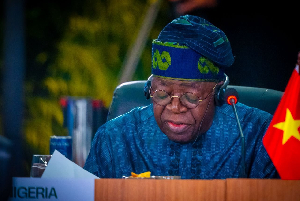The eldest son of a former Deputy Senate President, Ike Ekweremadu, has blamed the Economic and Financial Crimes Commission (EFCC) for his father’s travails in the United Kingdom where he is being detained.
Lloyd Ekweremadu blamed EFCC for contributing to the continued detention of his father in a court document he filed at the Federal High Court in Abuja.
He filed the document dated 21 November to challenge an order obtained by the EFCC for an interim forfeiture of his father’s houses and other assets scattered within and outside the country.
While Mr Ekweremadu battles with the Nigerian government at home, he and his wife, Beatrice, are grappling with charges filed against them in the UK for allegedly trying to harvest David Nwamini’s kidney for their ailing daughter.
In June, the London Metropolitan Police arrested the Ekweremadus over allegation that Mr Nwanini, whom the couple took to London for organ harvesting, was a minor.
PREMIUM TIMES reported that the prosecutors said the Ekweremadus were charged with bringing a 15-year-old boy from Nigeria to the UK with the claim that he was to be given a better life in the UK but was actually to harvest his organ.
While Mr Ekweremadu languishes in jail, his wife is on bail. As they face charges of organ trafficking in London, the couple insist that Mr Nwanini is 21 years old.
In an affidavit filed in support of his application challenging the interim forfeiture of his father’s assets, he said the EFCC wrote a letter to the London court, urging it to refuse him bail.
“That at the respondent (EFCC)’s letter to the Metropolitan Police supported the prosecuting authority’s opposition to my father’s bail application, which was refused,” the supporting affidavit read in part.
In the court document filed on his behalf by his lawyer, Adegboyega Awomolo, a Senior Advocate of Nigeria (SAN), the applicant said the forfeiture order was granted the federal government in error, because the EFCC suppressed information and facts in respect of the assets.
“It was an abuse of judicial process, oppressive, intimidating and unfair to the parties interested in the properties forfeited in the interim,” Lloyd who is a shareholder in one of the forfeited assets – Power Properties Nigeria Limited, said.
Giving an undertaking to safeguard the forfeited properties until his father returns to Nigeria, the junior Ekweremadu said the EFCC fraudulently obtained the forfeiture order for government by concealing information that investigation on the 40 properties started as far back as 2008.
He further said the EFCC was aware he was in detention in London when the request for forfeiture of his properties was filed and argued.
He sought the reversal of the forfeiture order placed on his assets came up before the Federal High Court in Abuja on Thursday.
But speaking in court when the case came up for hearing on Thursday, EFCC’s lawyer Silvanus Tahir (SAN), denied that his client was behind Mr Ekweremadus woes in London.
Mr Tahir, however, admitted that the EFCC wrote the London Court based on a special request.
He added that it was a normal routine for anti-graft agencies to exchange information that would be of help to one another.
Mr Tahir did not oppose the request for stay of proceedings untill Mr Ekweremadu resolves his matter before the London Court.
However, he opposed the request for setting aside of the forfeiture order.
After taking arguments from counsel in the suit, the judge, Inyang Ekwo, slated 25 January, 2023 for ruling.
This newspaper reported that the court had on Friday, 4 November, ordered the interim forfeiture of 40 landed assets traced to Mr Ekweremadu in some parts of the country and outside the country..
Mr Ekwo issued the order following an ex-parte application filed and moved by Ibrahim Buba, a lawyer to the EFCC.
The judge who granted the request, ordered the anti-graft agency to publish the interim forfeiture order of the property in a national daily within seven days.
The judge had directed that anybody who had interest in the forfeited assets to indicate within 14 days of the publication of the interim forfeiture order on why the property should not be permanently forfeited to the Federal Government.
The forfeited assets include: 10 properties in Enugu, three in the US, two in the UK, one in Lagos, nine in Dubai, the United Arab Emirates and 15 located in the Federal Capital Territory (FCT).
General News of Thursday, 15 December 2022
Source: www.premiumtimesng.com













